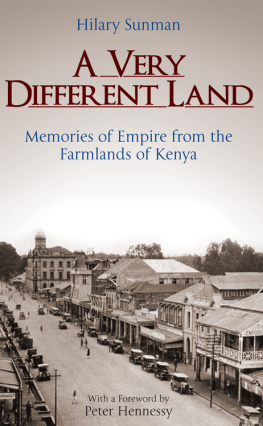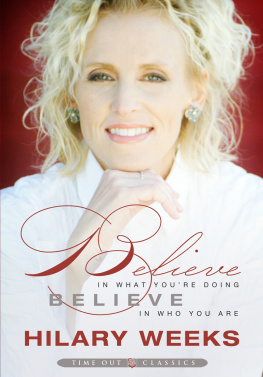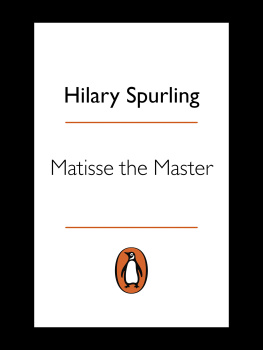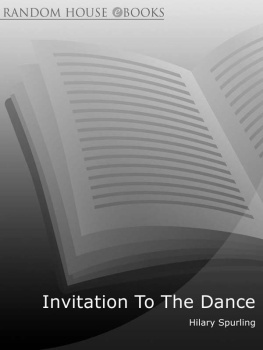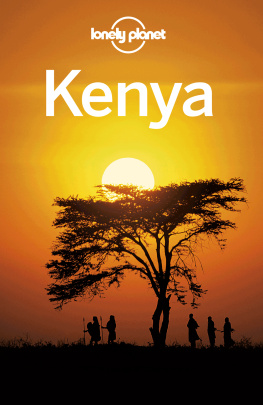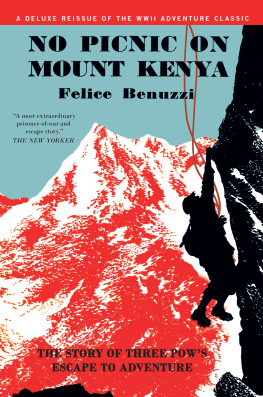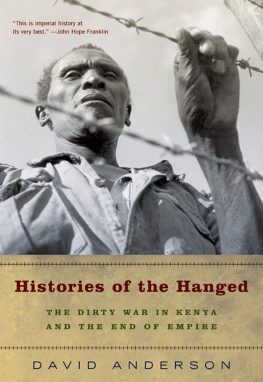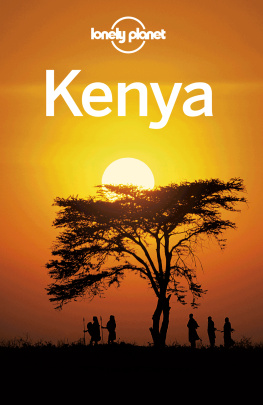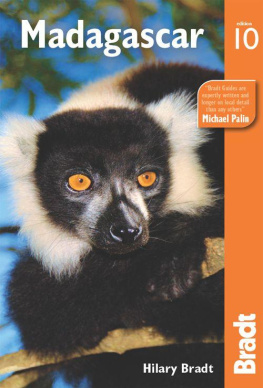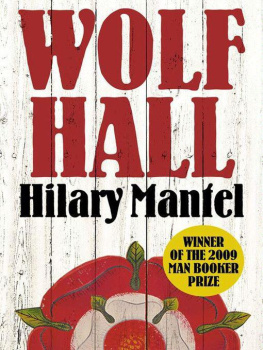A VERY
DIFFERENT LAND
A VERY
DIFFERENT LAND
Memories of Empire from the
Farmlands of Kenya
Hilary Sunman
The Radcliffe Press
LONDON NEW YORK
An imprint of I.B.Tauris
Published in 2014 by The Radcliffe Press
An imprint of I.B.Tauris & Co Ltd
6 Salem Road, London W2 4BU
175 Fifth Avenue, New York NY 10010
www.ibtauris.com
Distributed in the United States and Canada
Exclusively by Palgrave Macmillan
175 Fifth Avenue, New York NY 10010
Copyright 2014 Hilary Sunman
The right of Hilary Sunman to be identified as the author of this work has been asserted by her in accordance with the Copyright, Designs and Patents Act 1988.
All rights reserved. Except for brief quotations in a review, this book, or any part thereof, may not be reproduced, stored in or introduced into a retrieval system, or transmitted, in any form or by any means, electronic, mechanical, photocopying, recording or otherwise, without the prior written permission of the publisher.
Every attempt has been made to gain permission for the use of the images in this book. Any omissions will be rectified in future editions.
ISBN: 978 1 78076 996 7
eISBN: 978 0 85773 681 9
A full CIP record for this book is available from the British Library
A full CIP record is available from the Library of Congress
Library of Congress Catalog Card Number: available
Typeset in Sabon by Saxon Graphics Ltd, Derby
For my parents and their
generation of colonial servants
CONTENTS
LIST OF PLATES
FOREWORD
As a teacher of history, it is difficult to explain the British Empire to todays students. Its geographical expression at any one time is easy enough. It is the range of imperial motivations that is tough the spectrum that stretched from the monstrous to the altruistic with pretty well everything in between. Empire as a phenomenon lays itself open to parody, disapproval veering on condemnation, conspiracy theory and monocausal explanation. That is why books like Hilary Sunmans are so important. The richness, texture and carefully sensitive recreations within these pages are a powerful and necessary antidote to those who come to imperial history to sneer and smear bearing their broad brushes and primary colours.
Hilary loved the two central characters of the book. But the world of Owen and Dorothy draws in so many others. She has a deft touch for character, mood and moment. Lytton Strachey, in his fabled life of Queen Victoria warned biographers of the perils that await those authors who seek to penetrate the secret chambers of consciousness. But Hilary is very good on motivations both of Owen and Dorothys generation and that of her own those who had a late imperial childhood, became the first post-imperial generation, sought to come to terms with it and did so by harnessing those altruistic impulses to the cause of aid and development. Her Reflections children of empire chapter is fascinating and brimming with both a personal and a wider perspective.
What really adds to the fascination of A Very Different Land is the Sunman family bond. It is also a treat to read and absorb. It passes, too, the great test of any book it leaves you wanting more. How intriguing it would be if Hilary turned sociologist and social anthropologist by comparing her fellow professionals, who did their training just as the British government completed its dash for the imperial exit, and those of Owens who completed their training when the British domination of palm and pine seemed set fair for many decades more than turned out to be the case. A sensitive analytical mind and a fluent pen are needed to rescue Owen and Dorothys generation from what Edward Thompson called (albeit in very different historical context) the enormous condescension of posterity. These Hilary possesses, and as this book shows she is as at home with high policy making as she is with Owen trying to find ways of protecting the maize from weevils in Nyanza Province.
Few in Hilarys and my generation are neutral about empire. It still has the capacity to induce an emotional spasm sometimes several conflicting spasms given the range of imperial motivations and experiences. We have a desire to make careful historical sense of it and to distil its better essences for the purposes of aid policy and development funding today. Hilarys book is a very considerable contribution to both.
Peter Hennessy, FBA
Attlee Professor of Contemporary British History
Queen Mary, University of London
April 2013
ACKNOWLEDGEMENTS
In the writing of this book I have been fortunate to meet a number of people who have inspired and helped me, in Kenya and in England. An excellent starting point was Peter Ayre and his wonderful database of all Europeans who lived and worked in Kenya between the wars. He introduced me to James Foster and Roy Griffin in Nairobi, both closely involved in the cathedral and the choir. James shared material from his biography of Leonard Beecher, while Roy, who sadly died recently, offered thoughtful memories and anecdotes, giving me a great sense of continuity from the period I am writing about to the present. Roy introduced me to Rosemary Gardner and her wit and charm and encyclopaedic address book put me in touch with many who have been involved in the musical life of Kenya in the past 50 years. The Rhodes House collection of the Bodleian Library in Oxford has been a rich source of archive material and documents on Kenya and agriculture of the period. In Kenya, Titus Murithi from Meru, Lukas Alebe and Washington Omundi were charming and helpful. Bridget Cass introduced me to her great friend Elizabeth (June) Watkins, who welcomed me to the elite band of writers about Africa and set me right on many things. Kate Barker helped me reshape the book to bring more life to the characters, which is as well, since I must also thank Peter you must write about these people Hennessy without whom I would probably not have embarked on the project. Finally, Peter, my husband; I have often mused on the effusiveness with which writers thank their spouses, but now I understand it. He has read every word more than once; he cooked for me; sent me off to purdah to concentrate on the writing; and has supported me and the project throughout. Thank you, Peter.
LIST OF PEOPLE
This story contains references to a number of characters, all real, starting with my parents, Dorothy and Owen Sunman. The principal others are listed below.
Agricolas and administrators
Denzil Blunt
John and Stella Booth
Ted Gaddum
Stuart Gillett
Alex Holm
Tom and Margaret Hughes Rice Roger Lambert
Bill Leckie
Bill and Hilda Lyne Watt
Cedric Oates
Donald and Betty Storrs-Fox Tom and Margaret Watson
Missionaries
Dr John Arthur
Leonard Beecher
Canon Henry Leakey
Archdeacon Owen
Musicians
Philip Angore
Valerie and Tony Davis
John Dixon
Bronslaw Fryling
Rosemary Gardner
Roy Griffin
Graham Hyslop
Billy Isherwood
Arthur Kemole
Nat Kofsky
Atigula Luvai
Peter Mence
Dick Moss
Ben Ogola
Francis Olude
Washington Omundi

